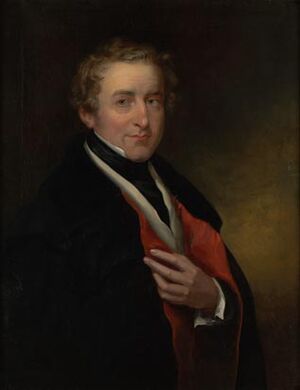Sir Robert Peel (February 5, 1788- July 2, 1850) was a British politician, and British nationalist following the October Revolution of 1817. Originally a member of the Tory Party, Peel lost an election to be a member of Parliament in 1809, when nearly every Tory lost due to the defeat in the Second Seven Years War. Taking defeat in stride, Peel lent his support to General Arthur Wellesley (whom he described as a closet Tory) and under this platform was elected to Parliament in 1812. Wellesley became Prime Minister in 1815, and Peel worked with him to attempt to bring the country to order.
On October 24, 1817, Wellesley led a violent revolution to overthrow the British monarchy, which was successful; he declared himself Chancellor, and began his dictatorship. In the midst of these events, Peel dropped all support; he was a nationalist who supported the King, and his father was a rich industrialist who risked death under Wellesley's (later changed to Wellington) regime. He fled the country along with William IV (George IV had been killed during the revolution) and they traveled Europe for the next year. In 1818, he arrived in the URAS with the King to ask for asylum. Peel, who had quickly gained William's trust, acted as an unofficial diplomat between the British monarchy and King Andrew I. The talks were successful, and the monarchy was given asylum in Philadelphia, in a section that was later nicknamed "Little London."
For the rest of his life, Peel acted as a front-man for the monarchy, given speeches and gaining influence in the American government to try to convince them to hold a military intervention to restore the monarchy. For most of his life he remained a firm British-nationalist, and somewhat anti-American, although Peel eventually developed a grudging respect for his adopted home. He was one of the architects between the 1836 marriage of John I and Victoria, William's niece and heir. Robert Peel died in 1850 at age 62, still a firm enemy of the British Commonwealth and the spread of Cromwellingtonism.
